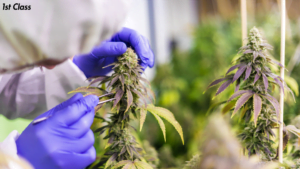Cannabis, long stigmatized as a recreational drug, has emerged as a subject of increasing interest in the field of medicine. This article explores the therapeutic potential of cannabis, highlighting its medicinal applications and the growing body of evidence supporting its use in treating various health conditions.
Pain Management by Cannabis in Medicine:
One of the most well-known medicinal uses of cannabis is for pain management. The cannabinoids present in cannabis, such as THC and CBD, interact with the body’s endocannabinoid system, which plays a role in pain regulation. Cannabis has shown efficacy in alleviating chronic pain associated with conditions like arthritis, neuropathy, and multiple sclerosis.

Nausea and Vomiting:
Cannabis has been widely studied and utilized for its antiemetic properties. It can help reduce nausea and vomiting, particularly in patients undergoing chemotherapy or those with gastrointestinal disorders. THC, in particular, has shown effectiveness in managing these symptoms.
Neurological Disorders:
Cannabis has shown promise in the treatment of various neurological disorders. CBD, a non-psychoactive component of cannabis, has been studied for its potential in managing epilepsy and reducing the frequency and severity of seizures. Research also suggests that cannabis may be beneficial in conditions like Parkinson’s disease, Alzheimer’s disease, and multiple sclerosis.
Mental Health:
Cannabis is being explored for its potential in mental health disorders. CBD has shown promise in reducing anxiety symptoms and may have antipsychotic properties. However, the effects of THC on mental health are complex and require careful consideration, as high doses or prolonged use may have adverse effects on certain individuals.
Palliative Care:
Cannabis has gained recognition in palliative care, providing relief for patients with terminal illnesses. It can help alleviate pain, improve appetite, reduce anxiety, and enhance overall quality of life in these cases.
Conclusion of Cannabis in Medicine:
The medical applications of cannabis are expanding as scientific research continues to uncover its potential benefits. While more studies are needed to fully understand its efficacy, cannabis has shown promise in pain management, nausea control, neurological disorders, mental health conditions, and palliative care. As the medical community continues to explore and refine the use of cannabis, it is important to approach its medical application with proper regulation, dosage control, and consideration for individual patient needs.




